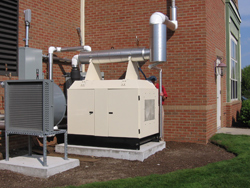 Reed Hayes, founder of DG Power Systems, extends the economies of small-scale, distributed energy production to small-sized businesses “beginning at the base of the commercial-industrial pyramid.”
Reed Hayes, founder of DG Power Systems, extends the economies of small-scale, distributed energy production to small-sized businesses “beginning at the base of the commercial-industrial pyramid.”
His four-year-old startup enterprise, located in Lewistown, PA, offers systems able to produce power at four distinct levels of capacity (rated at 50, 70, 80, and 90 kilowatts) to apartment buildings, fast food restaurants, fitness centers, nursing homes, and hotels. These customers and others of similar size have enjoyed few of the benefits of energy deregulation offered to larger industrial and commercial power consumers.
Hayes’s induction-fed co-generation units provide electricity and hot water on site from GM internal combustion engines that typically drive sport utility vehicles. DG Power Systems modifies the engines to run on natural gas, drive a generator, and produce electricity that throws off hot water, which a heat exchanger converts to thermal energy. One unit thus serves two large sources of expense–electricity and heat–for many small businesses.
The economy of combined electric and heat generation also addresses the thermodynamics shaping America’s greatest energy dilemmas. As Hayes notes, “A typical coal-fired plant converts about 35 percent of the input fuel’s energy into electricity.” Most of coal’s thermal value–about 65 percent–goes up the stack wasted in billowing steam. Moreover, 6-8 percent of coal’s captured energy is lost during electricity’s transmission to customers.
Hayes’s company now offers four power systems to a market segment that has been mostly ignored by cogeneration equipment manufacturers. DG Power Systems’ latest system–shipped to an assisted-living facility in New Jersey in November–fine tunes the balance between a customer’s needs for electrical and thermal energy. Rated at 90 kilowatts of capacity, DG Power Systems’ new unit, which was tested during long runs in development as high as 115 KW, promises an output that Hayes believes more states, including Pennsylvania which has paid little attention to cogeneration, will find increasingly attractive as regulators more strongly encourage the development of distributed sources of energy.
Source: DG Powers Systems, Reed Hayes
Writer: Joseph Plummer
To receive Keystone Edge free every week, click here.